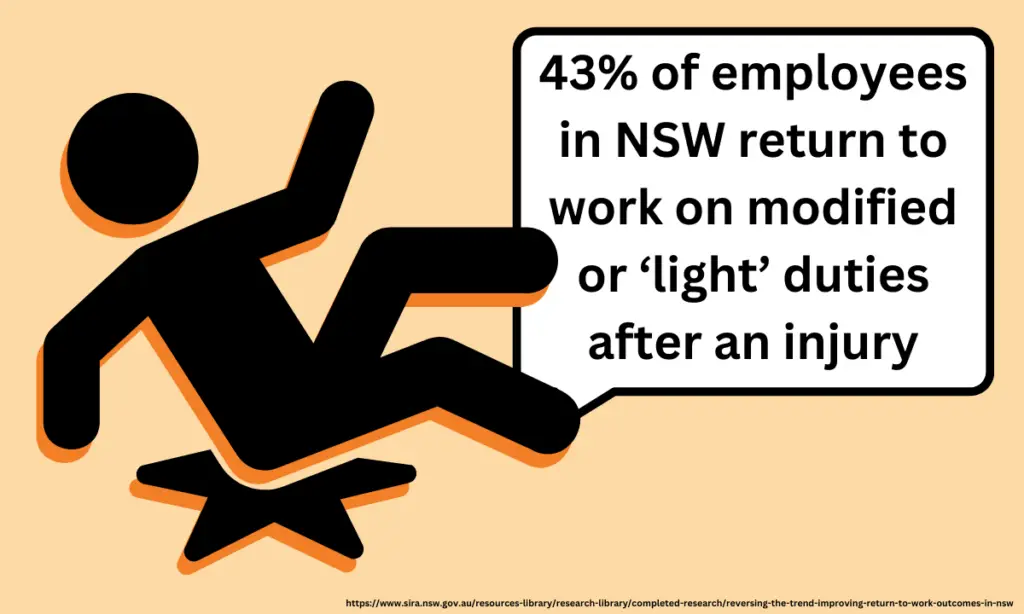If you’ve been injured at work, you’re likely feeling overwhelmed—physically, emotionally, and financially. You may be wondering how long you can stay on light duties at work, whether you’ll receive compensation, and what your legal rights are. The good news is that Australian workplace laws protect injured workers, ensuring you receive the support you need to recover.
Under NSW workers’ compensation laws, you may be entitled to:
✅Medical expenses – coverage for doctor visits, rehabilitation, physiotherapy, and surgery.
✅Weekly compensation payments – income support while you’re unable to work.
✅Light duties at work – modified tasks that are suited to your medical restrictions while you recover.
✅Lump sum compensation – you may be eligible for a lump sum payment if your injury reaches a threashold.
Your employer and insurer are legally required to support your return-to-work plan, but if you’re facing challenges, such as being pressured to return to full duties before you’re ready, you have rights. Understanding these entitlements is the first step toward protecting your health and financial stability.
Keep reading to learn more, or contact our experienced workers’ compensation lawyers today for a free claim assessment to understand your rights and options after a workplace injury.

What Are Light Duties at Work?
Suffering a workplace injury can turn your daily routine upside down. Tasks that once felt effortless may now seem impossible, leaving you uncertain about your ability to work. Fortunately, light duties (also known as suitable duties) provide a way to stay employed while you heal.
Rather than pushing yourself beyond your limits, light duties allow you to work within your medical capacity, ensuring a safe and steady recovery. These temporary adjustments aren’t just about keeping you on the job—they’re about protecting your health and helping you gradually regain your strength.
What Do Light Duties Look Like?
Light duties are designed to reduce physical or mental strain while still keeping you engaged in the workforce. The specific tasks assigned to you will depend on your injury and job role, but the goal remains the same: to prevent further harm while supporting your return to work.
Here are some common examples of light duties:
✅ Administrative Tasks – Shifting to paperwork, data entry, or phone-based tasks if your usual job is physically demanding.
✅ Reduced Hours – Working shorter shifts to prevent overexertion while your body heals.
✅ Modified Physical Tasks – Avoiding heavy lifting, repetitive movements, or other difficult activities that could worsen your injury.
Light duties aren’t about cutting corners—they’re about finding a balance between work and recovery. The right approach can help you maintain financial stability without putting your health at further risk.

How Long Can You Stay on Light Duties After an Injury at Work?
After a workplace injury, one of the biggest concerns is how long you can stay on light duties before being expected to return to full capacity. The truth is, there’s no one-size-fits-all answer—every recovery journey is different.
Some workers heal quickly and transition back within weeks, while others require months or even longer to recover fully. Your time on light duties will depend on how your body responds, what your doctor recommends, and whether your employer is willing to accommodate you.
What Determines the Duration of Light Duties?
The length of time you can stay on light duties (suitable duties) depends on several factors, including your medical condition, workplace policies, and workers’ compensation requirements. A key document in this process is your Certificate of Capacity, provided by your GP, which outlines your work restrictions and recovery progress.
Key Factors That Influence Light Duties Duration
- The Severity of Your Injury Compared to Employment Duties – A minor wrist strain might only require a few weeks of adjustment, but what if you use your wrists for work constantly (e.g. tradies) or you have multiple injuries or a serious injury? That could lead to extended light duties or even permanent work modifications. Your Certificate of Capacity will reflect the extent of your limitations and whether full duties are an option.
- Your General Practitioner (GP) – Your GP’s opinion on your capacity to work is a major factor. Your GP is the one that determines your capacity to work in the Certificate of Capacity. If you think your GP is not helping you in returning to work, you’re entitled to change GP’s.
- Workplace Policies – Some employers have structured return-to-work programs, making it easier to stay on light duties for an extended period. Others may have limited options for modified tasks, which could affect how long they can accommodate you.
- Your Recovery Progress – Regular medical check-ups determine if you are improving or if you need more time before returning to full duties. Your doctor will update your Certificate of Capacity accordingly, either extending your light duties period or clearing you for full duties.
Your Certificate of Capacity is crucial because:
✅ It officially confirms your ability to perform light duties.
✅ It must be renewed every 28 days to continue receiving workers’ compensation.
✅ It protects you from being forced back to full duties too soon by outlining your medical restrictions.

Is My Employer Required to Offer Light Duties at Work?
In New South Wales, employers must provide suitable duties for injured workers whenever it is reasonably practicable. This isn’t just about keeping you on the payroll, it’s about supporting your recovery while ensuring workplace productivity.
However, not all employers are proactive in accommodating injuries. If you feel pressured to return to full duties before you’re ready, it’s important to understand your rights and seek legal advice if necessary.
Your Rights as an Employee on Light Duties
While on light duties, you are entitled to fair treatment and workplace protections:
- Appropriate Task Assignment – You should only be given tasks that align with your medical restrictions.
- Fair Compensation – Your employer must pay you in line with the work you perform, following workplace policies and employment laws.
- A Safe Work Environment – Your workplace must not put you at risk of further injury or slow down your recovery.
If your employer refuses to accommodate your medical restrictions, you don’t have to face it alone. There are legal pathways to ensure your rights are upheld, and our experienced team of personal injury lawyers is here to support your right to claim the compensation you deserve. Contact us today for a free claim assessment so you can understand your entitlements and how to claim them.
Can Your Employer Force You Back to Full Duties?
After an injury, the thought of returning to full duties can be daunting. What if pushing too hard, too soon just makes things worse? While your employer may expect you to resume normal work duties, they cannot force you back before you’re medically fit.
Your recovery isn’t just about getting back to work, it’s about getting back safely. Rushing the process could lead to setbacks, reinjury, or even permanent damage. That’s why the decision to return to full duties should always be guided by medical professionals, not workplace pressure.
If your Certificate of Capacity doesn’t support a full return to work, your employer cannot force you back to full duties.
Returning to full duties should be a gradual, well-supported process, not a sudden demand. If your employer isn’t willing to accommodate your recovery, it may be time to seek our workers compensation lawyer’s free advice to protect your health and future. Our experienced team of Workers’ Compensation lawyers are here to help you claim your entitlements after an injury. Contact us today for a free claim assessment so you know where you stand.

What Happens If You Can’t Return to Full Duties?
For many injured workers, the reality sets in: what if you never fully recover? What if the pain, the limitations, and the challenges don’t go away? If your injury prevents you from returning to your pre-injury role, you are not alone, and you have options.
Exploring Alternative Work Arrangements
If full duties are no longer possible, your employer may:
✅ Adjust your role permanently – Some workplaces can modify tasks or create a new position that aligns with your medical restrictions.
✅ Offer a Work Trial Program – This allows you to explore a different role within the company or even with a new employer to assess your work capacity.
✅ Support redeployment – In some cases, employers help injured workers transition into a different department or job that better suits their new abilities.
What If You’re Unable to Return to Work?
If your injury has had a significant impact on your ability to work, you may be eligible for:
✅ Lump Sum Workers’ Compensation for Permanent Impairment – If your injury has caused permanent damage, you could be entitled to a one-time compensation payment. Both physical injuries as well as psychological injuries can qualify for a lump sum payment, but eligibility is determined by a Whole Person Impairment (WPI) assessment.
To qualify, your injury must meet the minimum WPI threshold set by NSW workers’ compensation laws.
Lump sum payments start at $28,840, but can reach up to $740,550. The higher your impairment rating, the greater your potential compensation.
🔍 Read more about lump sum payments and WPI eligibility here.
✅ A Total and Permanent Disability (TPD) Claim – If you can no longer work in a role suited to your education, training, or experience, you may be eligible for a TPD claim. Many Australians have TPD cover automatically included in their superannuation but may not realise they can claim it. A successful TPD claim provides a lump sum payout, typically ranging from $60,000 to $350,000, helping to ease financial burdens when you’re unable to return to work. A TPD claim is separate from a Workers’ Compensation lump sum payment, meaning you may be eligible for both.
🔍 Click here to learn more about how a TPD payout can support you.
For more information about the compensation you may be entitled to, contact our experienced personal injury lawyers today for a free claim assessment. With our No Win, No Fee policy, you won’t have to worry about any upfront costs or out-of-pocket expenses. Let us help you navigate your claim and secure the compensation you deserve.

Can I Make a Work Injury Damages Claim?
If your workplace injury was caused by your employer’s negligence, you may be entitled to a Work Injury Damages claim, also known as a common law claim. Unlike standard workers’ compensation, this claim allows you to seek a lump sum payout for the financial losses you’ve suffered due to your employer’s failure to provide a safe work environment.
When Can You Make a Work Injury Damages Claim?
To make a common law claim, you must prove that:
1. Your employer was negligent – This means they failed in their duty of care to provide a safe workplace, leading to your injury.
2. Your injury resulted in at least 15% whole person impairment (WPI) – A independent medical assessment must confirm that your injury has caused significant and lasting impairment. This assessment includes both physical and psychological impairment. Our work injury damages lawyers organise this process whilst acting on your behalf to get you the maximum compensation payout.
Examples of Employer Negligence
Your employer may be considered negligent if they:
❌Failed to provide proper training or safety equipment.
❌Ignored workplace hazards, leading to an accident.
❌Allowed unsafe work practices to continue.
❌Forced or pressured you to perform duties beyond your medical capacity.
What Can You Claim Under Work Injury Damages?
A successful Work Injury Damages claim can provide a lump sum payout covering:
✅ Past and future loss of earnings – Compensation for income lost due to your injury and any future earning capacity you’ve lost.
✅ Superannuation contributions – If your inability to work has affected your retirement savings.
While a Work Injury Damages claim can provide a significant lump sum payout, accepting it means you will forfeit all ongoing workers’ compensation benefits, including weekly payments and medical expenses. Because this decision is final, it’s essential to carefully consider your options and fully understand the potential impact before proceeding with a common law claim.
Our team of experienced work injury damages lawyers are here to provide you with the information you need to make an informed decision. Contact us today for a free claim assessment so you can maximise your entitlements.
Contact Withstand Lawyers Today
If you’re wondering “how long can you be on light duties at work” and need clarity on your workers’ compensation rights, our experienced personal injury lawyers are here to help. Whether you’re on light duties and unsure of your next steps or considering a claim, we’ll guide you through the process every step of the way.
Call us today on 1800 952 898 or complete the form for a free claim assessment.

Issa Rabaya
• Bachelor of Laws
• Graduate Diploma in Legal Practice
• Approved Legal Service Provider to the Independent Review Office
• Member of the Law Society

Issa Rabaya
• Bachelor of Laws
• Graduate Diploma in Legal Practice
• Approved Legal Service Provider to the Independent Review Office
• Member of the Law Society



